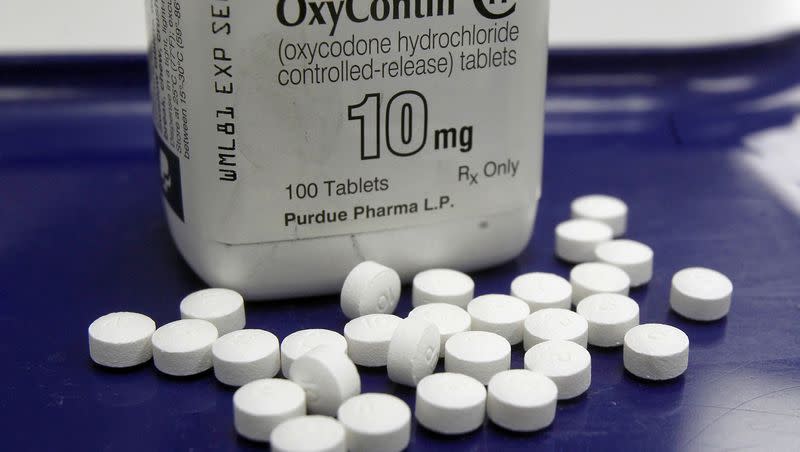White House asks Congress for emergency funds that could send millions to Utah to combat opioid crisis

- Oops!Something went wrong.Please try again later.
The Biden Administration is asking Congress to approve billions in emergency funds to combat the opioid crisis in a targeted approach that officials say will bolster border security, and send millions in federal funds to states.
Under the proposal, Utah would be eligible for up to $10 million in grants.
On Wednesday, Rahul Gupta, director of the White House Office of National Drug Control Policy, briefed reporters on the funding request that he called “urgent.”
“These are bipartisan priorities that are aimed at saving American lives. This is not a red state or a blue state issue,” Gupta said.
Related
Fentanyl is becoming more potent, prevalent and cheap in Utah, law enforcement tells lawmakers
‘Fourth wave’ in the overdose crisis involves this deadly drug
The request is twofold — it would direct $1.2 billion to the Department of Homeland Security to combat the flow of fentanyl into the southern border. According to the department, roughly 90% of the fentanyl seized by officials is at legal ports of entry, and Gupta said the funding could be used to hire more border patrol agents and other law enforcement personnel.
“Some Republican members (of Congress) have talked about how we need to strengthen the border. Well, this is their chance,” said Gupta. “... This funding is going to mean more vehicles scanned and more dangerous and deadly drugs like fentanyl getting seized at our borders before it can ever reach our communities.”
The second part of the request is $1.55 billion that the White House says will be directed at states through the State Opioid Response Grant Program. Those grants can be used for addiction treatment, overdose prevention measures, and recovery support services.
Utah has been receiving funds through this program since 2017, however the current grants expire in September 2024. The Utah Department of Health and Human Services, specifically the Office of Substance Use and Mental Health, is responsible for applying for the grants, which fund ongoing harm reduction and recovery projects, a spokesperson for the department said on Wednesday.
“This means that states will be better equipped to expand access to treatment. This means that states will be able to keep building out their recovery support services to help the more than 20 million-plus Americans who are currently on their recovery journey,” Gupta said, noting that the grant program has already been used to purchase millions of opioid reversal kits.
According to a White House estimate, Utah will be eligible for about $10 million. An additional $250 million will be directed towards tribal governments.
The funding will be allocated based on the severity of the opioid crisis in each state, as well as population. Pennsylvania, Ohio, New York, New Jersey, Massachusetts, Florida and California are each expected to received over $50 million, the high end of the spectrum.
On the lower end, Hawaii, Alaska, Vermont, North Dakota, Montana and Nebraska could be eligible for $3 to $4 million.
Fentanyl has become increasingly potent, affordable and common in Utah. From 2018 to 2021, a total of 496,870 doses of fentanyl were seized by Utah law enforcement, most of that in 2021 when officers reported finding 328,183 doses.
In 2022, Utah law enforcement reported 1,485,355 doses seized, more than double what was seized in the four previous years, combined.
Fentanyl started killing Utahns with increased frequency during that same timeframe. In 2018, the drug accounted for 8% of overdose deaths — by 2022, 33% deaths were from fentanyl, surpassing prescription drugs and heroin and second only to methamphetamine as the deadliest drug in the state.

